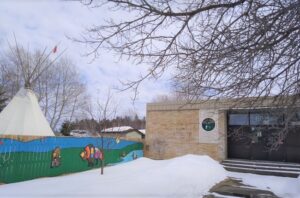Better Beginnings Better Futures pushes for greater education and awareness on Indigenous history
Trigger warning: readers may be triggered by the recount of Indian Residential Schools. To access a 24-hour National Crisis Line, call: 1-866-925-4419. Community Assistance Program (CAP) can be accessed for citizens of the Anishinabek Nation: 1-800-663-1142

By Rick Garrick
SUDBURY — Better Beginnings Better Futures recently held a panel discussion on the intergenerational impacts of Indian Residential Schools for Indigenous and non-Indigenous people on March 10 at the Northbury Hotel and Conference Centre in Sudbury. The gathering, which was attended by about 50 people, also included an interactive dream catcher workshop in the afternoon. Better Beginnings Better Futures provides child-centred activities and community development in Sudbury’s Flour Mill/Donovan neighbourhood.
“Part of my role as the Indigenous-led coordinator is to teach people and educate people about Truth and Reconciliation. So last Friday, we had a Truth and Reconciliation Circle where we had brought community members [and] colleagues in the community that we work with to come and discuss the impacts of Residential Schools for both Indigenous and non-Indigenous people and how the history has impacted everybody,” says Desneige Taylor, Indigenous-led program coordinator at Better Beginnings Better Futures. “The reason why we wanted to discuss that is so that we could … have that understanding to begin that healing process. The circle was held for EarlyON professionals and educators so they could have a safe space to come and learn about those impacts, about the history, ask questions if they had any questions, and then go back into the community and teach the little ones and teach others what they’ve learned so that reconciliation piece can start.”
Taylor says one of the key points brought up during the panel discussion was that the education provided in schools about Indigenous history was “very mainstream.”
“Not all truth was taught from an Indigenous perspective,” Taylor says. “In some schools, people didn’t even learn about Indigenous literature and history. That history is kind of getting lost so we need to bring that history back so that we can understand and we can make changes.”
Taylor says other impacts brought up during the panel discussion were that Indigenous people often don’t get good jobs and Indigenous culture and teachings don’t get recognized as professional development.
“And if someone passes in our culture, you only get three bereavement days a year,” Taylor says. “But when someone passes in the Indigenous culture it’s a four-day ceremony, so we’re not always able to go through that grieving process for closure purposes.”
Taylor says the panel discussion also included how Indian Residential School Survivors were mistreated and how they did not learn about tender love and care during their time in the institutions.
“So they weren’t able to transfer that to their children,” Taylor says. “As much as we try to heal over time, and each generation tries to be a little better, there’s still that impact, that emotional loss.”
Jeannette McQuabbie, Indigenous-led program assistant at Better Beginnings Better Futures, says the panel discussion was “very good.”
“We talked about the history of Residential Schools and pretty much our whole way of life was disrupted by the Residential Schools,” McQuabbie says. “We lost our identity and our feeling of belonging.”
McQuabbie says her mother did not talk about her time at Indian Residential School.
“I started school a couple of years late and that’s why I ended up going to the Indian Day School and not the Residential School,” McQuabbie says. “I think my parents might have had something to do with that, where they didn’t want me to go the Residential School.”
McQuabbie says they will be holding more gatherings where Indigenous people can share experiences with non-Indigenous people in order to educate and create awareness.
“And to tell the true history of this country,” McQuabbie says. “We are trying our best to survive our trauma that was inflicted on us.”

